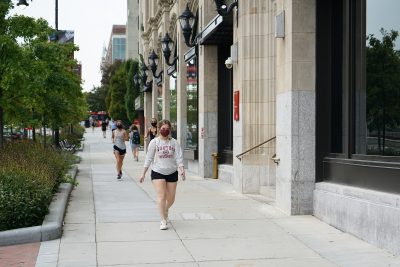
By Tanisha Bhat, Sangmin Song
Undergraduate students returning to Boston University for the Spring semester will have to undergo testing twice a week, according to an email sent by President Robert Brown, as the University deals with a spike in COVID-19 cases caused in part by the spread of the Omicron variant.
The email, sent out Jan. 5, came as BU reported a staggering 423 positive COVID-19 cases, the highest single-day number of cases since testing began in Aug. 2020. The previous record was 212 cases recorded on Dec. 28.
As part of the new measures, isolation for individuals who test positive has been changed from 10 to five days if the individual has no symptoms or the symptoms are resolving. President Brown also wrote in the email that “classes will be taught in-person” as originally planned.
While many students reacted positively to the new changes, some worried about whether it will be enough to curtail the spread of COVID-19, especially when classrooms and residences fill up.
“I can’t really predict how COVID is going to be, but for now, I think it seems to be a pretty decent strategy that they’ve applied,” said Manind Gera, a first-year graduate student in the Graduate School of Arts and Sciences.
Rachel Lapal Cavallario, BU’s associate vice president of public relations, said graduate students, faculty and staff will continue to test once a week, later expanding on the decision to change the policy solely to undergraduates.
“I believe the decision had a few layers but a primary reason is because many undergraduates live in communal settings such as the residence halls,” she wrote. Gera said he believes the policy should have applied to graduate students too.
“I’m going to be on the campus five days a week as well,” he said. “I would have been fine with getting tested twice a week.”
As part of the new measures, intensive graduate programs which began on Jan. 3 will be completely online until the start of the Spring semester on Jan. 20, Brown stated in the email.
The University also requested that faculty, when possible, record lectures and make them available to students who cannot attend class because they are in isolation through Feb. 18.
Nino Mtchedlishvili, a first-year grad student in the College of Communication, wrote in an email she is “skeptical” about remote learning, but appreciates BU offering the option.
“I am not sure if the one month period is going to be enough. I think university administration might consider prolonging the accessibility to recorded lectures, if the present gets more dramatic,” Mtchedlishvili wrote.
In his email, Brown added faculty will be able to teach remotely in the likely event they or one of their close contacts tests positive for the virus.
“Special provisions will be made that will allow faculty to teach by remote means during this disruption so that the cadence of the semester is interrupted as little as possible,” the email said.
Brown also announced that the University will be returning to testing protocols used last academic year but also adding “unobserved testing” to “increase the ease of testing” for COVID-19.
Greta Bauer, a junior in the College of Arts and Sciences, said she believes a transition to unsupervised testing will make the process easier for students.
“Anything that keeps us in-person is okay,” she said. “I think it’s going to be more efficient and there’s going to be less backlash.”
Hannah Emily Landsberg, associate director of Student Health Services, wrote in an email that this will likely happen early in the Spring semester after the initial move-in period.
“Dropping off an unobserved sample is quicker than completing your test on-site. Testing sites for students will remain at 808 Comm Ave and the Medical campus site at 72 E Concord Street,” Landsberg wrote.
When asked about changes to the isolation period from 10 to five days, Landsberg noted how this aligns with the guidelines set by the Massachusetts Department of Public Health.
“Ongoing studies, including research at the University, have shown that individuals clear newer variants of the virus more quickly than the previously instituted 10 day isolation, especially those who are vaccinated,” Landsberg wrote.
BU recently mandated all students, faculty and staff get a booster shot by Feb. 4. Brown’s email stated that vaccinated and boosted individuals will not have to quarantine if they were in close contact with someone who tested positive. Gera said he believes this is “pretty bad news.”
“Even if you don’t catch COVID symptoms, you can still be a carrier to people who have not gotten a booster,” he said. “I’m still not eligible for a booster shot since I got my vaccine in India…so for me, this requirement is kind of weird because I could still catch COVID from variants even if they don’t have symptoms.”
Mtchedlishvili wrote she doesn’t believe a five-day isolation period to be enough time for students to completely recover from the virus, adding seven to eight days could be a better option.
“We need more social responsibility during this semester. We need to understand that the pandemic is not over and the only way we can go through this is to consider that we are not the only ones we need to take care of, as our actions may reflect dozens of others,” she wrote.
More details on quarantine and isolation protocols will be released soon on the BacktoBU website, Brown stated.





























































































































